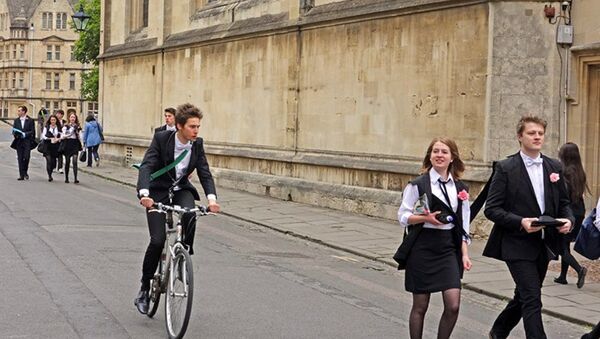The Sutton Trust, a charity and think-tank focused on education, published a report highlighting how many of the key sectors of British society are dominated by former "public-school" pupils (the baffling UK term for fee-paying private schools).
Our Leading People 2016 research published today looks at the educational background of the UK's professional elite https://t.co/OwFSr6x1n2
— The Sutton Trust (@suttontrust) February 24, 2016
The Trust's data analysis showed that, while the percentage of privately-educated British citizens is around 7 percent, private pupils get an enormous share of the country's best jobs.
In the judiciary, 74 percent of top judges (hearing in the High Court or Court of Appeal) were privately educated; in the military, 71 percent of the army top brass (from two-star generals and up) went to a private school; in politics, private pupils make up 32 percent of MPs — reaching the even higher level of 50 percent in David Cameron's cabinet, and being still overrepresented (13 percent) in Jeremy Corbyn's shadow cabinet; in medicine, 61 percent of doctors were public school pupils, and 22 percent went to selective state-run grammar schools.
@suttontrust report proof that our school reforms & overhaul of careers education needed to level the playing field https://t.co/Y9bJ8nB28R
— Sam Gyimah MP (@SamGyimah) February 24, 2016
Other categories involved are media — 51 per cent of leading news journalists were privately educated; in acting, the report pointing out, 42 percent of Bafta Award winners studied privately. High, but by comparison lower, is the percentage of British FTSE top executives who attended public schools: "just" 34 percent.
The study, carried out by Dr Philip Kirby, has triggered the creation of an All-Party Parliamentary Group whose aim will be to devise strategies to help less affluent people land senior jobs.
Widening access to top professions vital. Glad to see coverage of new @suttontrust report + work of parliamentary group on social mobility
— Claire Tyler (@ClaireT_UKLords) February 24, 2016
The Sutton Trust also attached its own recommendations to the report. Among them, it suggested that "the Careers and Enterprise Company should be resourced and encouraged to trial and identify what works in careers advice for disadvantaged pupils," and that "after four weeks all interns should be paid the National Living Wage," in order to encourage poorer young workers to take career-boosting internships.
The organization has already campaigned in the past for enhanced education equality, highlighting the UK's worrisome disparity of opportunities. In a study last year, the Trust warned that an excessive number of candidate MPs had attended private schools, and that 19 percent of them had studied at either Oxford or Cambridge, compared with one percent of the country's adult population.
"Oxbridge" graduates are also thought to be excessively represented in top media outlets such as The Guardian and BBC. While they are undeniably good universities, it has been found that wealthier pupils who have received a private education are twice as likely to enter Oxford or Cambridge than state-school pupils.



